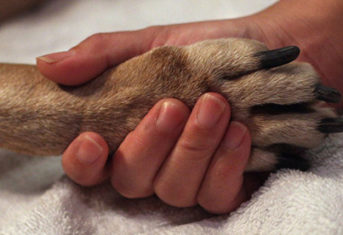Jack the Cat Found at JFK, Treated for Fatty Liver

Jack the Cat Found at JFK, Treated for Fatty Liver
After escaping from his cat carrier and going on the lam for 61 days in the baggage area of JFK Airport, just a few miles from The Animal Medical Center, Jack the cat is back. His return was widely reported in the NYC press.
It seems that Jack did not like the airport food and, according to The New York Times, is emaciated. The New York Post reports Jack is hospitalized in Queens and being fed through a tube to treat a “fatty liver.” The photograph in that article shows Jack wearing the dreaded cone to keep the tube in place.
Hepatic lipidosis, the medical term for fatty liver, occurs commonly in cats that are not eating. Nearly any medical condition that causes a cat to stop eating can result in the development of hepatic lipidosis:
- Upper respiratory infections
- Broken jaws
- Diabetes
- Inflammatory bowel disease
- Pancreatitis
- Cancer
How can I identify this problem in my cat?
Any cat that stops eating is at risk for developing hepatic lipidosis, and overweight or obese cats are predisposed. Owners may notice a yellow tinge (jaundice) of the ears (see image), skin or oral mucous membranes.
Analysis of a liver biopsy is required to make a definitive diagnosis, but elevations in liver enzymes on routine blood tests or an ultrasound may indicate lipidosis is the likely diagnosis.
What is the treatment?
Food! Simply feeding the cat can reverse hepatic lipidosis. Once a cat is sick with lipidosis, force-feeding of a high calorie diet through a tube inserted through the nostril, esophagus or directly into the stomach is required. Treatment of the inciting disorder – insulin for diabetes or surgery to repair a broken jaw – is also necessary. Veterinarians prescribe other supportive treatments such as fluid therapy to correct dehydration, vitamin, electrolyte and amino acid supplementation to correct deficiencies, and antiemetics if vomiting occurs. Return to health is never guaranteed, but if the cat survives the first critical days of therapy, the vast majority of cats recover.
The AMC has heard Jack is continuing to improve, and we wish him a safe trip home to California.
Photo by Dr. Ann Hohenhaus
________________________________________________________
This may also be found in the “Tales from the Pet Clinic” blog on WebMD.com.
For over a century, The Animal Medical Center has been a national leader in animal health care, known for its expertise, innovation and success in providing routine, specialty and emergency medical care for companion animals. Thanks in part to the enduring generosity of donors, The AMC is also known for its outstanding teaching, research and compassionate community funds. Please help us to continue these efforts. Send your contribution to: The Animal Medical Center, 510 East 62nd Street, New York, NY 10065. For more information, visit www.amcny.org. To make an appointment, please call 212.838.7053.


































